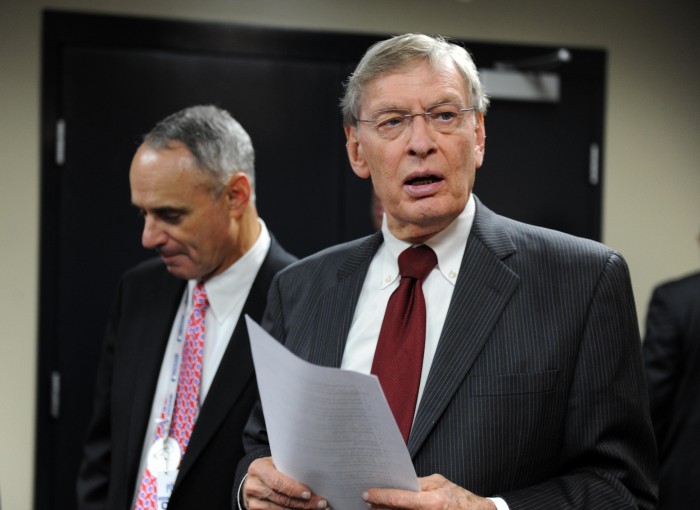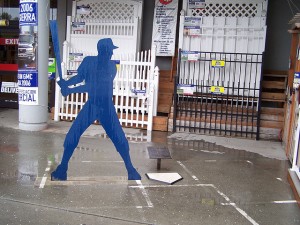A Lowe’s Hardware store sits in Seattle, Washington, in the space that used to be Sick’s Stadium, home of the Seattle Pilots. Home plate is still there, marked with a plaque, directly in front of the fencing section.
The Pilots were a financial disaster. Their attendance in 1969 was not awful — at 677,944, the Pilots sold more tickets than the Padres, Phillies, White Sox and Indians. Rather, the issue was with a company called SportService, a Minneapolis-based food distribution company. SportService has been the chief provider of concessions for Major League Baseball teams for decades, even serving as the Brewers’ concession company throughout their 45-year existence. SportService staked $2 million for the Pilots, contingent on becoming the team’s concession company, but Seattle law prevented any public building — like the Kingdome, into which the Pilots were eagerly awaiting to move once construction finished — from selecting a concessionaire without undergoing a competitive bidding process.
Dewey Soriano, an owner of the Pilots, is known to have told a SportService representative, “If we can’t put you in that dome, we recognize we might have to go someplace else.” Milwaukee emerged as the top option thanks to Bud Selig’s zeal to bring a team back to the city, following the Braves’ departure after the 1965 season, and due to the eagerness of Milwaukee fans to see baseball. To satisfy the latter, Selig arranged for Milwaukee to host a combined 20 Chicago White Sox home games in 1968 and 1969. Those games accounted for just over 10 percent of White Sox “home” games over those two seasons, but the 450,000+ tickets sold for those 20 games counted for over one-third of the White Sox’s total ticket sales in that span. Milwaukee showed it desperately wanted baseball, and the American League noticed.
Unlike the Kingdome, Milwaukee’s County Stadium had zero restriction on concessionaires, and with Selig willing to pay over $10 million for a team Pilots owners had purchased for just $5.3 million a year earlier, negotiations moved swiftly. Selig entered into a handshake agreement to buy the club, as he would later testify, during the eighth inning of Game 1 of the 1969 World Series. The Pilots entered into bankruptcy shortly after the season ended, and mere days before Opening Day 1970, Selig and Milwaukee were awarded the franchise.
Thanks to the quick turnaround, the Brewers were unable to implement their planned navy-blue-and-red color scheme, a throwback to the original minor-league Milwaukee Brewers of the American Association. The jerseys were delayed with the rest of the equipment in Provo, Utah, where truckers awaited orders on whether they should head back to Seattle or onward to Milwaukee. The Brewers only had time to replace the wordmarks, and thus the blue-and-gold color scheme stuck.
The full story of how the Pilots were wrested away from Seattle and brought to Milwaukee, as well as the ensuing years of litigation in which Seattle eventually won its own franchise, the Mariners, is worth reading. David Eskenazi of Sports Press Northwest offers a beautifully detailed rundown of all the backroom detailing and clever lawyering here.
This kind of origin, born out of another city’s loss and some questionably shady business and legal practices, isn’t unique to Milwaukee. Dig deeply enough into any franchise or any owner’s closet, and one is bound to find a skeleton or two. This is just part of the reality of being an American sports fan.
But it does, I think, make clear the ridiculousness of the whole concept of “franchise history” following an owner around the country. People in Seattle fought against the Pilots move every step of the way. Fans, whether from Brooklyn or Milwaukee or any other city, rarely follow franchises. Even if people often root for laundry, feelings are born out of state pride, city pride, or regional pride. The Milwaukee Braves and their 1957 championship season obviously has more to do with Milwaukee’s baseball history than a season played in what’s now a hardware store in Seattle. And yet, if you buy the franchise history view, that championship belongs in Atlanta.
It’s plainly silly, and a view that only makes sense if you buy into Donald Sterling’s edict that the owners “make the games.” Sure, maybe the owners can take the games away, but the games don’t last without the players. And they certainly don’t last without the fans and their pride in their community and their home.

